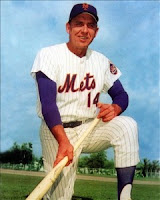Gil Hodges was a New York baseball legend. He made his major league debut as a Brooklyn Dodger in 1943, then returned to the Dodgers for good in 1947. Prior to 1947, the Dodgers had won one pennant in 26 years (1941) and had finished with a sub-.500 record in half of those 26 seasons. With Gil Hodges and National League rookie sensation Jackie Robinson on board for the '47 season, the Dodgers began a streak of excellence that lasted for two decades.
Hodges was a member of seven pennant-winning Dodger teams, winning the 1955 World Series in Brooklyn and the 1959 Fall Classic in Los Angeles. In his 15 seasons with the team, the Dodgers finished at least 10 games over .500 in all but one season (1958, their first season in Los Angeles). Gil's exceptional ability in all aspects of the game was instrumental to the Dodgers' extended success.
As a hitter, only teammate Duke Snider had more home runs and RBIs than Hodges in the 1950s. Snider and Hodges were the only two players in the major leagues to hit 300 HR and drive in 1,000 runs during the decade, with Hodges amassing 310 HR and 1,001 RBI from 1950-1959, including seven consecutive seasons with 100 or more RBIs (1949-1955).
As a fielder, Hodges won the Gold Glove Award at first base in each of the first three seasons of the award's existence. Had Gold Gloves been handed out prior to 1957, Hodges would certainly have won more.
After 15 seasons as a Dodger, Hodges became an original Met in 1962, hitting the first home run in franchise history before being traded to Washington in 1963 to become manager of the Senators, who were in their third year of existence. (The original Washington Senators became the Minnesota Twins in 1961, with an expansion franchise replacing them in Washington.) Hodges led the Senators to their first 70-win season in 1965 and managed them to a sixth place finish two years later, which was quite an accomplishment for a team that had never finished higher than eighth in the ten-team American League.
Hodges was traded to the Mets following the 1967 season, becoming their manager in 1968. Just like he did in Washington, Hodges led the Mets to their first 70-win season in '68, before surpassing all expectations in 1969 by leading the team to its first World Series championship. It was Hodges' third championship of his career, after winning two as a player.
Although the 1969 championship was Hodges' only title as a manager, he was still able to keep the Mets in contention for the division title in 1970 and 1971, the second and third winning seasons in franchise history. Sadly, Hodges passed away just days before the start of the 1972 season, ending a four decade love affair with the game of baseball.
Prior to his death in 1972, Gil Hodges had been on the Hall of Fame ballot for four seasons, never getting more than 50% of the vote. However, after his sudden passing, Hodges began to receive posthumous support from the voters. After receiving 161 votes (40.7% of the 396 ballots cast) in 1972, Hodges was named on 57.4% of the ballots (380 ballots, 218 votes) in 1973. Hodges continued to gain support from the writers in later years, cracking the 60% mark on three occasions (1976, 1981, 1983), but never reaching the magic 75% mark needed for enshrinement.
In his final 13 seasons of eligibility, Hodges received at least 50% of the votes 11 times. His teammate on the Dodgers, Duke Snider, received no more than 35.6% of the vote in each of his first six seasons of eligibility. However, he was able to gain more support from the voters in the late '70s before he was finally enshrined in his 11th year of eligibility (1980) with 86.5% of the votes.
Gil Hodges has been unfairly kept out of the Hall of Fame for almost half a century. How is it that his teammate and contemporary, Duke Snider, was able to garner more support from the voters over the years while Hodges didn't?
Once again, 75% of the votes will be needed for enshrinement. That means 12 of the 16 veterans will need to write Gil Hodges on their ballot to make things right.
Gil Hodges was one of the best players of his era, both offensively and defensively. After his playing career was over, he led two expansion teams out of the cellar and won a championship with one of them. If that's not enough to make it into the Hall of Fame, I don't know what is. On December 4, the Veterans Committee will cast their votes. It's time for them to fix things once and for all by voting Gil Hodges into the Hall of Fame.
Will Joan Hodges be celebrating her late husband's Hall of Fame induction soon? We sure hope so!




No comments:
Post a Comment